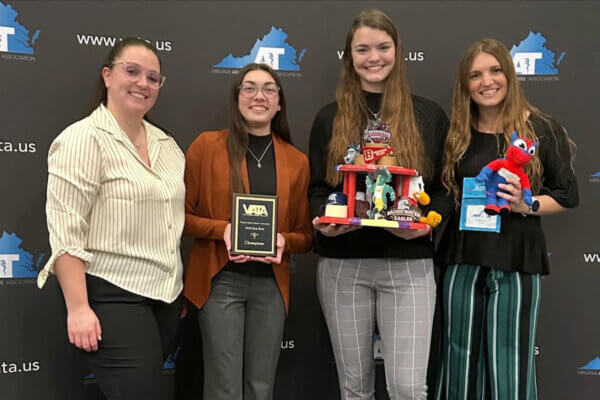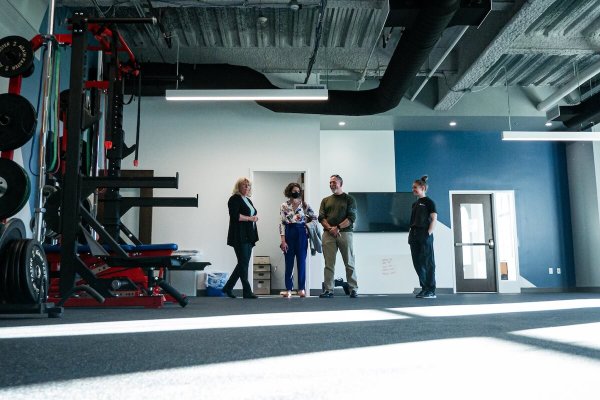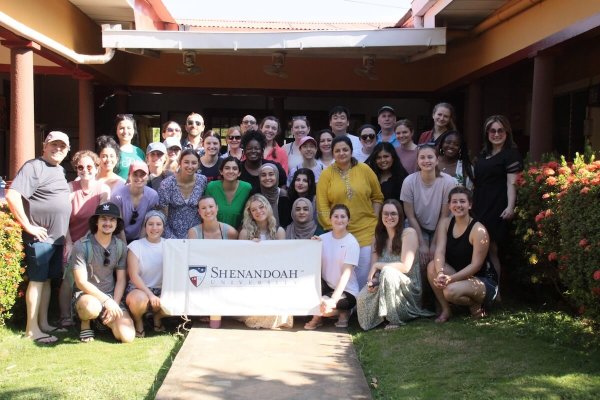
Master of Science in Athletic Training
Be on the frontline of health-care service for athletes and the physically active.
Become an expert in preventing, recognizing, managing and rehabilitating injuries that result from physical activity. Specializing in prevention, rehabilitation, and management of injuries resulting from participation in athletics and physical activity, the athletic trainer is an integral member of the sports medicine team. The athletic trainer works in cooperation with the physicians, parents, coaches, and administrators to maintain the safety and well-being of athletes and the physically active.
Become a member of the SUAT family and experience our reputation, rigor, outstanding program outcomes and value-added programming!
Reputation
- First professional MSAT program state of Virginia
- First dual degree DPT/MSAT program in Nation
Rigor
- Online classes to fully immerse students in clinical experiences
Allowing for immediate translation of what is being learned in the virtual classroom into practice - Virtual reality and high-fidelity simulation of emergency care scenarios
Ensuring students have first-hand experience managing emergency situations - Completion of a scholarly capstone project
Developing students competent in the consumption and dissemination of evidence-based research - Workshops
The professors go above and beyond to facilitate excellence. They build you up with encouragement while keeping very high standards. This balance of accountability and inspiration creates a positive environment which allows for curiosity, discipline, and the utmost quality in our work. Those involved in our education make this program special and worthy of all praise and recognition.
Joshua Dalton ’23 | Master of Science in Athletic Training
Learn About Athletic Training at Shenandoah University
Shenandoah University’s Division of Athletic Training offers a unique combination of “hands-on” clinical training, classroom teaching, distance-based education and clinical research. Clinical field experiences are available on campus as well as in other settings such as with professional sports organizations.
The Master of Science In Athletic Training program has been uniquely designed to offer clinical field experiences in the fall and spring semesters under the direct supervision of certified athletic trainers in a variety of settings, including Shenandoah University, other affiliated colleges and universities, affiliated high schools, affiliated professional athletic training room settings and affiliated sports medicine clinics. As a graduate program, the Division of Athletic Training is committed to incorporating clinical research as part of the professional educational experience. Students propose, perform, defend and present a scientific study as a culminating project in the curriculum.
Program Highlights
- Unique clinical experiences in high schools to professional sports and spanning country from coast to coast
- Global Experiential Learning opportunities, including collaborative programming in Ireland with Dublin City University and an inter-professional opportunity to become a Wilderness First Responder
- Certification in Graston Level 1 IASTM
- Functional Movement Screen (FMS) Certification
- Orthopedic Physician Extender (OPE-C) training in casting and bracing with certification opportunity
- Additional certificate program options include Performing Arts Medicine and Population Health
>95% First Time Board Exam (BOC) pass rates last 5 years
100% of graduates employed and/or seeking an additional advanced or professional degree
Diverse employment settings include but are not limited to:
- Secondary school athletics
- Collegiate athletics
- Professional sports
- Performing Arts Medicine (The Houston Ballet)
- Industrial Rehabilitation (Tesla)
- Sports performance (EXOS)
- Physician settings (INOVA Sports Medicine)
- Public Safety and Military settings
- Higher Education/Teaching
Molly McEvoy ’19, ’20 who earned a Master of Science in Athletic Training and a Performing Arts Medicine certificate, is employed at Harkness Center in New York City as an athletic trainer with the Dance Theatre of Harlem. Harkness is known as one of the premier dance medicine facilities in the United States. “The Performing Arts Medicine (PAM) certificate program has put me on the best track ever and set me up for true success in this field. Without the support, tough love and amazing teaching of the SU Master of Science in Athletic Training and PAM programs, I wouldn’t have been able to make my dream a reality.”
Shatora Lane ’12, ’14 continued her education in Athletic Training at Shenandoah after graduating with her bachelors degree. She received her masters which led to her successful career. Lane is the head athletic trainer at Shepherd University. Lane works with staff to provide on-site care for athletes, handles prevention programs, and postsurgical rehabilitation. Lane thanks the Shenandoah community for her success and tells future students, “ If you have an idea or passion, reach out to someone on campus that specializes in that area and enlist their advice or mentorship.”
Eric Rhodes’ ’13 dream became a reality when he accepted an assistant strength and conditioning coach position at the University of Maryland. “The SU baseball program helped me develop leadership skills and a great work ethic that pushed me every single day to be the best person that I could be.”
Stephen Gober ’98 is the head athletic trainer for the Louisville Bats, a Triple-A affiliate for the Cincinnati Reds. He also use to be an assistant athletic trainer for the Washington Nationals for three years. The faculty and mentors at Shenandoah pushed Gober when he needed it, which served him well. “Take advantage of all the experiences you can while you are there, it’s worth it in the end.”
Upon completion of the classroom and clinical requirements of the Master of Science in Athletic Training Program a student will:
Understand and implement the prevention of injuries to athletes and physically active individuals of all ages and abilities.
Demonstrate competency in the various methods and well-care practices which can be used to help bring about a reduction in illnesses to athletes and the physically active.
Assess and administer acute care for injuries and illnesses to athletes and the physically active, and differentiate between cases that require referral to emergency services or other healthcare providers.
Integrate knowledge and clinical psychomotor skills while problem solving through an orthopedic examination and making a clinical diagnosis.
Demonstrate competency in the application, progression and modification of therapeutic intervention while managing injuries to athletes and the physically active.
Demonstrate an understanding of the role of the athletic trainer with the biopsychosocial aspects of sports injury and illness, and application of the referral process.
Understand the role of the athletic trainer regarding healthcare administration in secondary school, collegiate, and clinic-based settings.
Appraise and synthesize the available research evidence, and contribute to the evidence-based practice in the field of athletic training.
Develop a sense of professionalism and incorporate the NATA Code of Ethics into clinical practice.
Recognize the value of interprofessional communication and practice as a member of a healthcare team.
Engage in community and professional service opportunities that contribute to the necessities of a local or global society.
| Course | Title | Credit Hours |
| Summer Year 1 | ||
| AT 501 | Risk Management and Emergency Care for Athletes | 3 |
| AT 511 | Prevention and Protective Intervention | 1 |
| AT 521 | Functional Human Anatomy I | 3 |
| AT 523 | Therapeutic Exercise I | 1 |
| AT 531 | Examination, Assessment and Diagnosis of the Lower Quarter | 3 |
| AT 552 | Therapeutic Modalities | 3 |
| Fall Year 1 | ||
| AT 505 | Evidence-Based Practice in Athletic Training | 1 |
| AT 571 | Sports Nutrition | 3 |
| AT 581 | Clinical Field Experience | 4 |
| AT 621 | Functional Human Anatomy II | 3 |
| Spring Year 1 | ||
| AT 504 | Psychological Intervention/Referral in Athletic Training | 3 |
| AT 533 | Clinical Medicine | 3 |
| AT 534 | Neurocognitive Assessment and Treatment of Head Injuries | 1 |
| AT 653 | Ethics/Professionalism in Athletic Training | 2 |
| AT 582 | Clinical Field Experience II | 4 |
| Summer Year 2 | ||
| AT 610 | Athletic Training Leadership Seminar | 1 |
| AT 624 | Therapeutic Exercise II | 2 |
| AT 631 | Examination, Assessment and Diagnosis of the Upper Quarter | 2 |
| AT 643 | Advanced Rehabilitation of Athletic Injury | 3 |
| AT 651 | Clinical Decision Making in Emergency Care | 1 |
| AT 667 | Capstone Project Development I | 1 |
| AT 698 | Imaging, Casting and Bracing of Orthopedic Injuries | 3 |
| Fall Year 2 | ||
| AT 614 | Pharmacology in Athletic Training | 2 |
| AT 668 | Capstone Project Development II | 1 |
| AT 670 | Health Care Administration | 2 |
| AT 681 | Clinical Field Experience III | 4 |
| AT 774 | Senior Seminar | 1 |
| Spring Year 2 | ||
| AT 711 | Theories and Practice of Conditioning Athletes | 2 |
| AT 682 | Clinical Field Experience IV | 4 |
| AT 767 | Capstone In Athletic Training | 1 |
| Select one of the following: | ||
| AT 799 | Independent Study | 2 |
| AT 720 | WFR for Medical Professionals | 2 |
| HP 550 | GEL | 2 |
SPARC+ provides orthopedic and fitness screenings and interventions with the goal of promoting health, enhancing performance, and managing musculoskeletal injuries for Shenandoah University students and faculty in these areas of study/participation.
Our accomplished and caring faculty serve as mentors beyond the classroom. As a team, they prepare you to serve as a compassionate athletic trainer, critical thinker and ethical leader. You’ll benefit from small class sizes that enable faculty members to provide individualized attention and nurture your academic and professional development.
The SU athletic training faculty come from a diverse background including research, the performing arts, and traditional settings. This provides an opportunity for students to tailor their experience to meet their career goals. In my case, these connections and support have provided me opportunities to present research at professional conferences, develop manuscripts for peer-reviewed publication, and network with other professionals in the field. Their willingness to support students is further exemplified by providing me an opportunity to pilot the first dual-degree MS Athletic Training and Master of Public Health program in the country!
Cade Watts ’23 | Master of Science in Athletic Training/Master of Public Health
Pre-Requisites For Master Of Science In Athletic Training
| Course | Credits |
| General Biology with lab | 4 |
| General Chemistry with lab | 4 |
| Human Anatomy with lab* | 4 |
| Human Physiology with lab* | 4 |
| One physics course with lab is required. A two-semester sequence is recommended | 4-8 |
| Statistics | 3 |
| Social/Behavioral Science | 3 |
| Psychology | 3 |
| Pick one: Biomechanics, Kinesiology, Exercise Physiology, Physics II | 4 |
| Total | 32-37 |
* When anatomy and physiology are taken as a combined course, two semesters are necessary to meet this requirement.
Spotlights

Shenandoah University’s Division of Athletic Training Shines At VATA Annual Meeting
SU’s student quiz bowl team brings home fourth straight title; two professors win awards for research presentations

Shenandoah University Cuts Ribbon On Wilkins Health & Fitness Suite
New space, named for the Wilkins family, provides state-of-the-art resources for students in health-related programs
